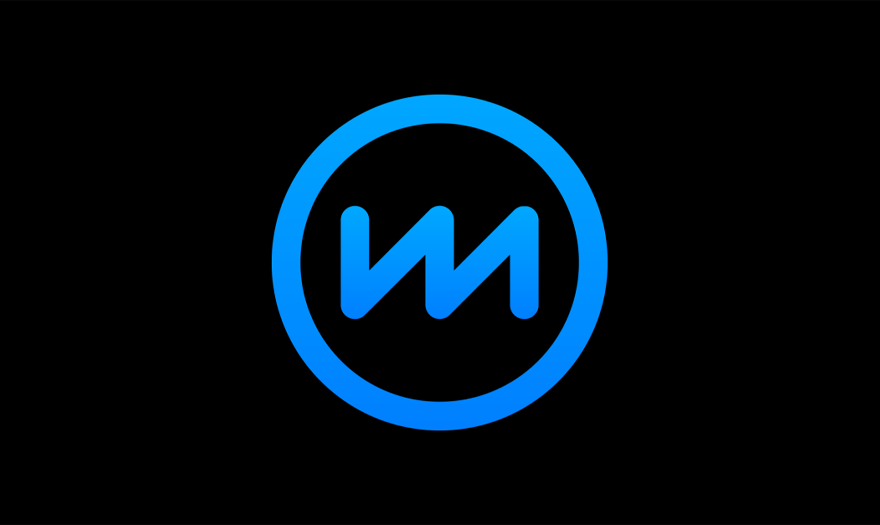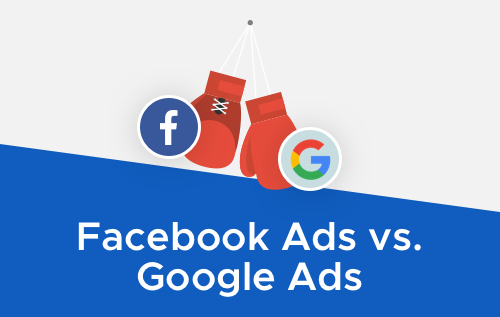
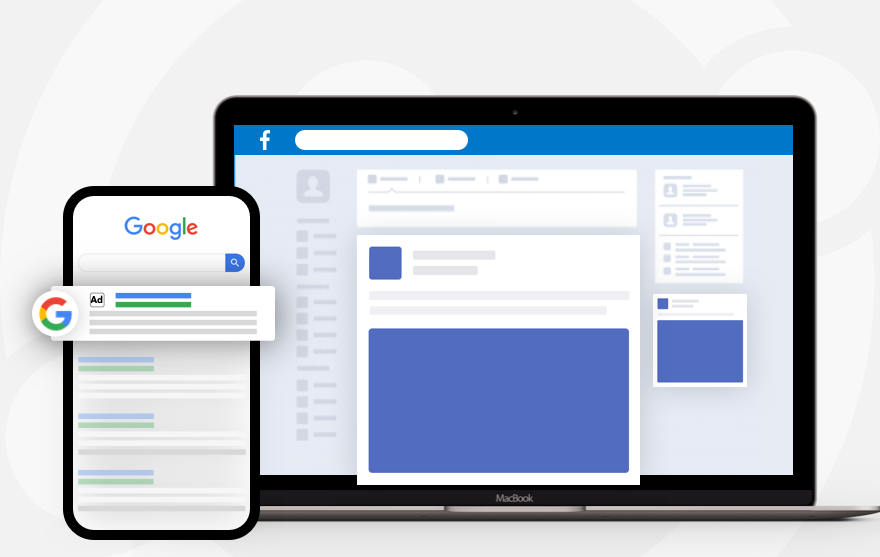
Most people are falling in love with the hype of running Facebook Ads, especially if they’ve already tried running their own Google ads and failed.
Truth is, Facebook and Google are two completely different platforms, targeting different types of buyers, in a totally different way.
Both however, account for massive revenues:
Facebook: $69.66 Billion in 2019, accounting for 98.5% of total revenue.
Google: $134.81 Billion in 2019, accounting for 83.4% of total revenue.
So which one is best for your business?
That depends on a lot of factors, maybe it’s Google, maybe it’s Facebook, or maybe it’s both.
The 6 Major Differences between Facebook Ads & Google Ads:
1. Needs vs. Wants
2. Ad Targeting
3. Types of Ads
4. Bidding Strategy – How You’re Charged
5. Life Expectancy
6. Management Costs
1. Needs vs. Wants
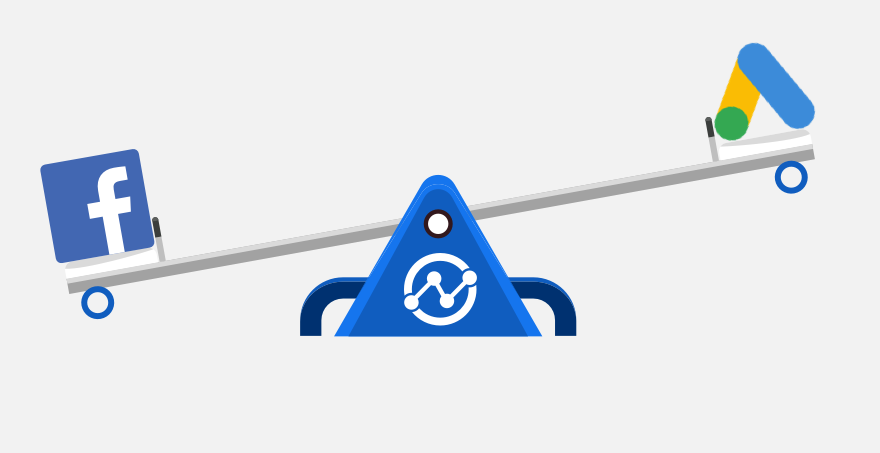
The biggest factor to consider when deciding where to run your ad is whether your product/service is a need or a want for your customers. When people need things, they search for them. When they want things, they browse for them.
Facebook Ads: Since Facebook ads are placed in spots where users don’t necessarily want to see them, we refer to them as disruptive, since they’re disrupting the user experience of people on their platform. This makes them a digital equivalent to traditional advertising like TV, radio & print ads.
With that in mind, Facebook is great for advertising products/services that are wants where an individual may be passively influenced to buy with proper targeting and a good offer, however they may have otherwise never been searching for that product at all.
Google Ads: On the contrary, the vast majority of ads served by Google only appear after a user engages with one of their search engines, like Google search or YouTube. This type of advertising is referred to as intent-based for customers that are in-market to buy what you’re selling.
Given that Google offers opportunities to capture a much more qualified click, these clicks will typically convert at a much higher rate into leads and sales. With that said, it’s also much more difficult to target your ideal customer if they aren’t already searching, potentially limiting your reach, which can pose challenges especially if you’re only running a short-term promotion or offer.
2. Ad Targeting
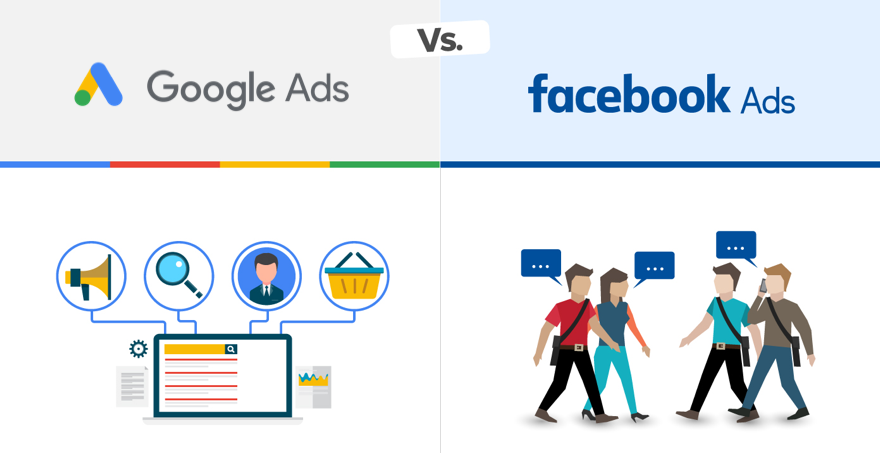
The methodologies behind how you choose who sees your ad and who doesn’t is also important to consider depending on what you know about your customers.
Facebook Ads: Facebook allows some of the advanced targeting methods particularly if you know the profile of what your ideal customer looks like. Arguably, Facebook knows more about you than anyone else does, and it will certainly let you use that to your advantage when advertising.
Facebook ads allow you to target by:
- Age
- Sex
- Location
- Interests
- Income
- Who you’re friends with
- Visitors that viewed your profile or website recently
While Google allows you to do much of the same, Facebook does offer one unique advantage. If you don’t know who your ideal customer is, then you can upload an email list of past customers and Facebook will automatically create an ideal customer profile for you!
This is called a lookalike audience and allows you to then go and target customers that match the same profile as those that have already bought from you in the past.
Google Ads: The primarily way to target users on Google’s network is by identifying the search terms or keywords that they’re using in Google’s search engine. This can be a daunting and time-consuming task for the inexperienced and is rather challenging if you haven’t done it multiple times before.
In addition to keyword targeting, Google offers the ability to target customers based on them being in-market to buy something, or if they have a natural affinity for what you’re selling.
In-market targeting refers to when Google has recognized a temporary shift in your online behaviours that favours buying something in particular, like a new car. This is something you might search for over the period of 2-3 months, then not again for years. This also explains why you will start seeing ads for things that tend to make a lot of sense.
There’s also lots of evidence that Google is using everything it hears through your phone to show you ads for things you haven’t even yet search for, simply because it came up in discussion with your friends! Crazy!
Affinity targeting is similar to in-market, instead it’s the things that a customer likes and/or buys on a regular basis. This could be clothes or shoes, for example, for a shopaholic.
In summary, both platforms offer unique advantages.
Choose Facebook if you need to get creepy with targeting a very specific type of individual.
Choose Google if a particular habit or interest as user has exhibited works more to your advantage.
3. Types of Ads
When it comes to ad types, there is a unique set of advantages and disadvantages for both ad networks. Depending on whether you’re developing a long-term advertising campaign to stand the test of time vs. a short-term campaign to promote a sale, you’ll want to choose platforms wisely.
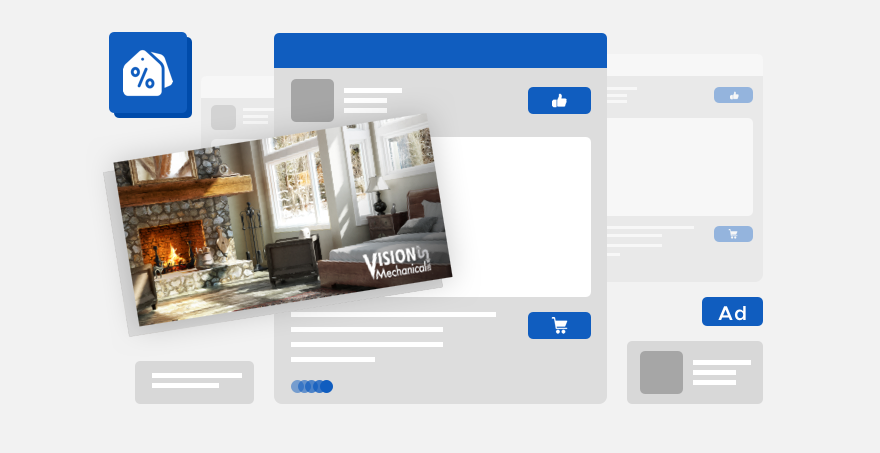
Facebook: By nature, most Facebook ads are delivered in a much more visual fashion than the majority of Google ads, which are text-based. This means that a lot more value can be conveyed by showing customers what you have to over instead of relying on telling.
Since Facebook offers the ability to leverage photos & videos in every ad, you can develop a much more compelling offer that explains more about what your selling before the click. You’ll often even see long-form lead ads that are designed to convert and collect your information right on Facebook itself.
In this regard, Facebook definitely offers advantages when it comes to building brands, promoting products/services nobody is searching for yet, or to communicate messaging to a defined audience.
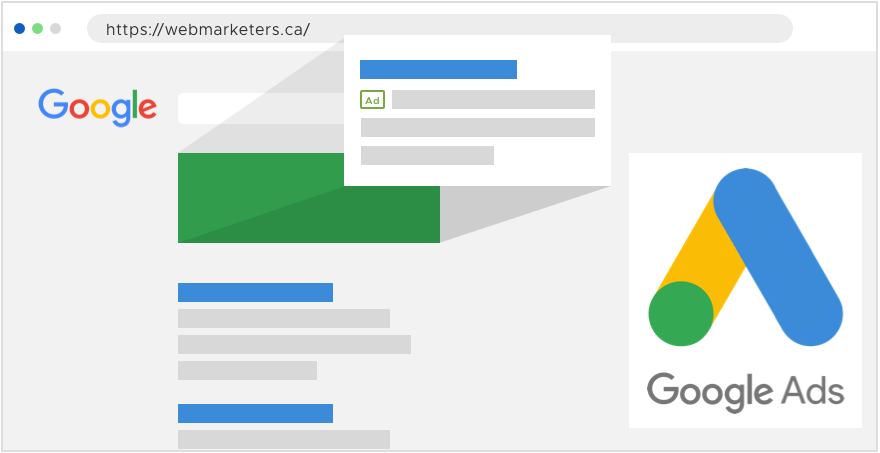
Google: Since most of Google ads (display ads excluded) only offer the ability to show text, you must rely a lot more on telling rather than showing, which doesn’t sell as well in today’s society.
With that said, Google offers some neat opportunities like competitor targeting, sponsored Google My Business Listings, and the ability to show useful call extensions right on ads themselves.
In summary, choose Facebook when looking to build your brand and showcase your products/services in a more visual manner.
Choose Google when appearance is less important and capturing a customer’s attention is more of a timely and opportunistic matter.
4. Bidding Strategy – How You’re Charged
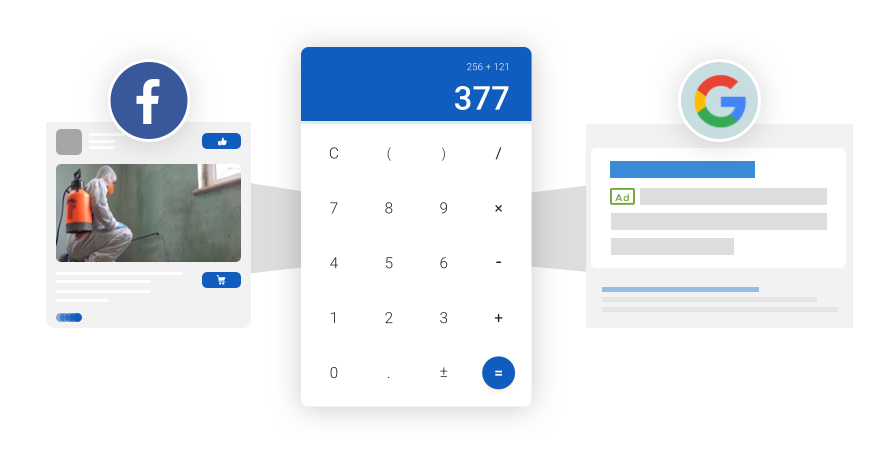
While Facebook and Google may appear to offer the same types of bidding strategies, in nature they’re actually very different.
Facebook Ads: One of the most common mis-understood facts is how you’re actually charged for ads on Facebook. While Facebook will let you choose to be charged based on many different options like impressions, engagement, clicks, conversion, leads etc. Facebook will always charge you based on CPM. (cost per thousand impressions)
What does this mean in practical terms?
You’re charged when your ad is shown to a user, regardless of their engagement.
Also, you’ll pay more when a lot of advertisers are competing to target the same users, i.e. targeting CEO’s or other high-profile positions.
The key is to design your ad for a high engagement rate, or high click-through-rate (CTR) in order to maximize the value of your advertising dollars. Since you’re paying for the impression anyways, ads that have a higher CTR will have much lower cost-per-click prices.
Google Ads: Conversely, Google always charges based on clicks, and most of the time, the cost per click price is much higher because there is higher user intent.
A good Google bidding strategy will be focused around attracting the right click, so you only pay when someone with a higher intent clicks your ad.
Therefore, careful ad copywriting to communicate your message and good targeting is all that much more important so you don’t waste money on bad clicks.
Pro Tip: Google also offers a fairly effective bidding strategy called target cost per acquisition. (CPA) Instead of choosing a max cost-per-click price like one normally one, this type of campaign allows Google the creative freedom to vary click prices based on the level of intent its identified in a particular user, as long as a target lead cost is maintained.
If Google things there is a very high chance a user will convert, they will bid higher automatically.
Alternative, if Google sees a lower intent to convert, they’ll bid less aggressively.
In summary, Facebook ads are charged based on impressions and Google ads based on clicks. Design Facebook ads to maximize engagement, and design Google ads for maximum intent.
5. Life Expectancy
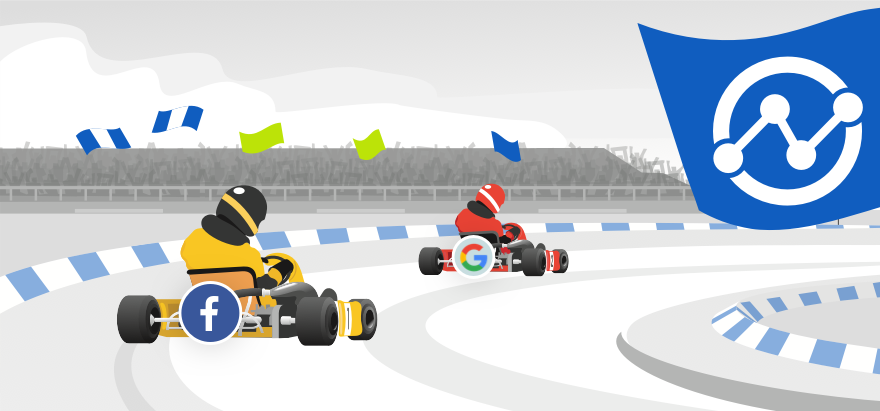
Ad life expectancy refers to how long an ad campaign will last and how well you expect it to perform from start to end.
Facebook Ads: There is a shelf life to Facebook ads. Typically the first couple hundred dollars and few days targeting, Facebook is using its algorithm to optimize and improve its targeting while it learns about your campaign. Expect metrics to be a little bit all over the place and a higher cost per click price.
After Facebook completes its learning phase, you’ll generally start to see increasing performance metrics until eventually your ads become stale. How long an ad campaign will last depends primarily on how big the target audience is. Once your audience has seen your ad multiple times and decide to engage or not to engage, your cost per click price will start to climb. This can be 3-10 days, or several weeks, but generally not longer than 1-2 months.
At this point you’ll want to refresh your ad design and copy and/or consider targeting a new audience.
Typically an agency will charge a higher management fee for Facebook ads due to the extra work required to design and write ad copy on a more regular basis.
Google Ads: A properly setup Google campaign will generally start out quite effectively out of the gate, and continue to improve over time. As data is collected Google will quickly figure out which of your ad copy variations works best and prioritize it over the weaker ad copy.
In addition to this, a good Google Partner will be actively looking for new keyword ideas, while negatively keyword clicks for unexpected keywords that don’t provide value.
A great Google Partner will also work to improve your ad quality scores and landing page conversion rates, ultimately building you an ad campaign that generates leads at a far lower cost than your competitors.
In general, there’s no pre-determined lifespan to Google Ad campaigns and they will generally improve with age.
Therefore, choose Facebook ads when you have a special offer or sale running for a short period of time that might be enticing to a targeted group of users. After all, Facebook ads are disruptive so you’ll have to be more convincing in order to get people off their wallets and excited to click on your ad.
Choose Google ads when you’re looking to build a long-term marketing campaign that will stand the test of time and bring you consistent new customer leads. You don’t need a special offer to capture Google clicks, but you will need a good competitive advantage since your ad is likely to be right next to 2-3 other competing companies and their call-to-action.
6. Management Costs
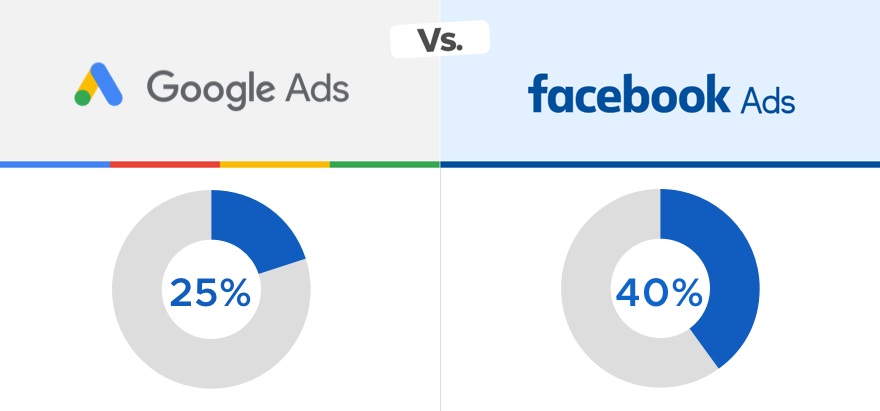
Given that we are an agency, it’s only natural we answer the question:
How Much Does it Cost to Have a Professional Run My Ad Campaign?
Facebook Ads: Our typical management fee for Facebook ad campaigns is 40% of the total budget. This includes:
- Coming up with campaign strategies
- Writing copy
- Designing ads and/or editing video for ads
- On-going optimization
- Setting up your Facebook pixel for proper conversion tracking
- Monthly reporting and consulting
This fee will be reduced in the event a client has already designed their own ad creatives or has a monthly budget of $5,000.
Example: For a client with a budget of $2,000/month, $1,200 will go directly to Facebook and we will retain $800 as our management fee.
Google Ads: We charge a management fee of 25% for Google Ads. This includes:
- All necessary keyword research
- Designing ad campaign structure (campaigns, ad groups, ad copy & extensions)
- Setting up Google conversion tracking on your landing page
- Landing page optimizations for high quality score
- Monthly reporting and consulting
Be hesitant of companies selling you on their management fees being lower. It is money well spent if your managing partner is doing their WHOLE job. Many companies will omit any efforts and optimizations on the website side of things (post-click) which may be your biggest challenge and opportunity depending on how your site converts.
We pride ourselves in showing the value associated with running your ad campaign 25% more effectively than anyone else will, or we’ll provide your money back.
Note: Ask your management partner or agency if they charge a setup fee for your ad campaign. We believe that our works stands for itself and will only take on clients we know are destined for success. Charging a setup fee may be required for a massive campaign, however typically it is just a sign of doubt that an agency doesn’t know how well your campaign will work, and thus how long you’ll stick around.
In closing, evaluate your ad campaign strategy closely and you’ll be able to determine whether Facebook ads or Google ads might be best for you.
If you’re still confused or uncertain, reach out to us and we’ll be happy to help you figure things out!
